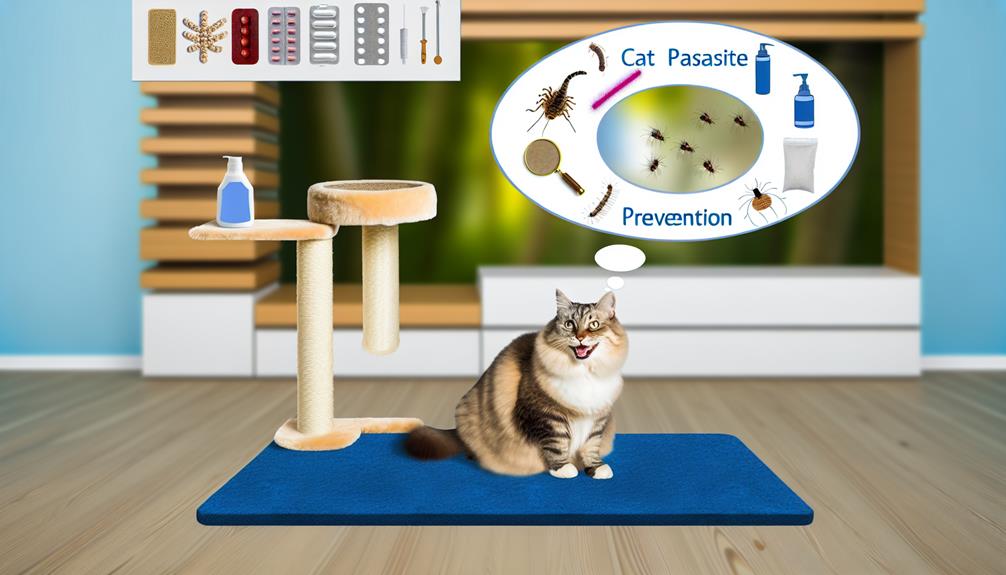Hey there, cat lovers! Today, we're going to talk about something super important: keeping our furry feline friends healthy and happy. Did you know that there are tiny creatures called parasites that can make our cats sick? Yep, it's true! But don't worry, because I'm here to teach you some top tips for preventing these pesky invaders. We'll cover everything from fleas to ticks and even intestinal worms. By the end of this discussion, you'll have a paw-some understanding of how to keep your cat parasite-free and their health in tip-top shape. So, let's dive right in!
Key Takeaways
Key Takeaways:
- Keeping your cat free from parasites is crucial for their health and happiness.
- Learn about common cat parasites and use effective methods to control them.
- Regularly check your cat for signs of parasites and keep their living space clean and safe.
- By following these tips, you can give your cat a healthy life without pesky parasites.
Importance of Cat Parasite Prevention
Why is it so important to prevent parasites in cats? Let's find out!
Did you know that parasites can make our furry friends really sick? They can cause all sorts of problems, from making them uncomfortable to putting their lives in danger. That's why it's important to take care of our cats and prevent parasites from bothering them.
One important way to prevent parasites is by taking our cats to the vet regularly. Vets are experts at spotting and treating parasites. They can give us the right medicine to keep our cats parasite-free, based on their age, lifestyle, and overall health.
✅ Using preventive medications for parasites has lots of benefits. Here are a few:
1️⃣ They protect our cats from the harmful effects of parasites, like weight loss, anemia, and skin problems.
2️⃣ Preventive medications can also stop parasites from spreading to humans. That means less risk of getting sick ourselves!
Common Cat Parasites to Be Aware Of
Beware of these Pesky Parasites: Fleas and Ticks!
Did you know that your furry feline friend can be bothered by some tiny creepy crawlies? Yes, parasites like fleas and ticks can cause a lot of trouble for cats. But don't worry, we've got the scoop on how to protect your cat from these annoying pests!
Let's start with fleas. These tiny insects love to snack on your cat's blood and can make them itchy and uncomfortable. They can even cause allergic reactions! Yikes! Fleas can also pass on tapeworms to cats, which can make them even sicker. To keep these pesky critters away, it's important to use flea prevention products. You can choose between topical treatments or oral medications, but make sure to talk to your vet first to find the best option for your cat.
Now, let's talk about ticks. These little buggers are like tiny spiders that attach themselves to your cat's skin and feed on their blood. Not cool, right? But what's even worse is that ticks can transmit diseases like Lyme disease and babesiosis to cats. To protect your furry friend, make sure to check them for ticks regularly, especially after they've been outside. You can also use special tick control products like spot-on treatments or collars. Just remember to ask your vet for advice on the best tick control method for your cat.
Effective Methods of Parasite Control
How to Keep Your Cat Parasite-Free: Easy and Effective Methods!
Did you know that there are tiny creatures that can make your cat sick? They're called parasites, and they can cause all sorts of problems for our furry friends. But don't worry, because there are ways to keep your cat parasite-free! Let's dive into some easy and effective methods:
- Preventative Medications: These are special medicines that are designed to kill or repel parasites. You can apply them on your cat's skin or give them as pills. They come in different forms like spot-on treatments, collars, or tablets. Preventative medications are really good at keeping away fleas, ticks, heartworms, and other yucky parasites.
- Natural Remedies: If you prefer a more natural approach, there are some essential oils that can help repel insects. Lavender or neem oil, for example, have natural bug-repelling properties. But be careful! Not all natural remedies are safe for cats, so it's important to check with a veterinarian before using them.
- Consult with a Veterinarian: Your cat is unique, and so are their needs. That's why it's important to talk to a veterinarian. They can help you figure out the best parasite control methods for your cat. They'll consider things like your cat's health and the types of parasites that are common in your area. Regular check-ups with a vet will make sure you're using the most effective methods for your cat's individual needs.
Tips for Regularly Checking Your Cat for Parasites
How to Keep Your Cat Happy and Healthy: Checking for Parasites Made Easy!
Hey there, cat lovers! Did you know that regularly checking your furry friend for parasites is super important? It helps keep them healthy and happy! Parasites can cause all sorts of problems for your cat, like itching, hair loss, and even serious health issues. But don't worry, we've got you covered with some easy ways to check for parasites.
- Take a Close Look: Start by giving your cat a good visual inspection. Check their fur, especially around their head, neck, and tail, for any signs of fleas, ticks, or lice. Look out for excessive scratching or biting, and any hair loss. If you see any redness, inflammation, or sores on their skin, it could mean they have parasites.
- Keep an Eye on the Poop: Yup, you heard that right! Checking your cat's poop can help you detect certain parasites. Look for any signs of worms, like little white or brown segments that look like grains of rice. If you spot anything weird, it's time to call the vet.
- Regular Vet Visits: It's not just for shots and cuddles – regular visits to the vet are crucial for parasite prevention. Your vet can do a thorough exam and even test your cat's poop to check for any hidden parasites. They'll give you the best advice on how to keep your kitty parasite-free.
Creating a Safe and Clean Environment for Your Cat
Creating a Safe and Clean Home for Your Cat: Tips and Tricks!
Hey there, cat lovers! Are you ready to make sure your furry friend has the best environment possible? We've got some awesome tips to help you create a safe and clean space for your beloved feline. Let's dive in!
- Litter Box Love:
- Make sure your cat has a clean and accessible litter box. They'll thank you for it!
- Choose a litter box that's big enough for your cat to move around comfortably.
- Don't forget to scoop the litter box every day and change the litter at least once a week. Fresh and odor-free is the way to go!
- Scratch That Itch:
- Cats love to scratch, so give them a scratching post to keep their claws healthy.
- A sturdy scratching post that's tall enough for your cat to stretch fully is the way to go.
- Place the scratching post in an area where your cat hangs out the most. They'll be purrfectly happy!
- Keep It Clean:
- Regularly clean your cat's bedding, toys, and anything else they come into contact with.
- Use pet-friendly detergents when washing their stuff. We don't want any harsh chemicals around our furry friends!
- Hazards Be Gone:
- Make sure your home is free from any potential hazards for your cat.
- Keep toxic plants out of reach, and watch out for small objects that could be swallowed.
- If you have windows without screens, consider putting up some window guards to keep your cat safe.
Remember, a safe and clean environment is essential for your cat's happiness and well-being. So let's roll up our sleeves and create the purrfect space for our feline friends!
Keywords: safe and clean environment for cats, litter box hygiene, cat scratching post, regular cleaning for cats, eliminating cat hazards
Frequently Asked Questions
Can Cat Parasites Be Transmitted to Humans?
Frequently Asked Questions
Q: Can cat parasites make humans sick?
A: Yes, some cat parasites can cause infections in humans. It's important to take preventive measures, like regular vet check-ups, good hygiene, and using products to control fleas and ticks on your cat.
Q: How can I prevent cat parasites from infecting me?
A: To prevent cat parasites from infecting you, make sure your cat gets regular check-ups at the vet, keep good hygiene by washing your hands after handling your cat or cleaning their litter box, and use flea and tick control products recommended by your vet.
Q: What should I do if I get infected with a cat parasite?
A: If you get infected with a cat parasite, it's important to see a doctor. They might prescribe medication to treat the infection and provide supportive care to help you feel better.
Q: Can cat parasites be transmitted through flea and tick bites?
A: Yes, some cat parasites can be transmitted to humans through flea and tick bites. That's why it's important to use flea and tick control products on your cat and take steps to prevent flea and tick infestations in your home.
Q: Are there any symptoms of cat parasite infections in humans?
A: Symptoms of cat parasite infections in humans can vary depending on the parasite. Some common symptoms include fever, fatigue, muscle aches, and swollen lymph nodes. If you have any concerns, it's best to see a doctor for a proper diagnosis.
Q: Can I cuddle and play with my cat if they have parasites?
A: It's best to avoid cuddling and playing with your cat if they have parasites, as some parasites can be transmitted to humans. However, with proper treatment and preventive measures, your cat can be parasite-free and you can enjoy cuddles and playtime together.
Q: How often should I take my cat to the vet to prevent parasite infections?
A: It's recommended to take your cat to the vet at least once a year for a check-up. Your vet can assess your cat's overall health and recommend preventive measures to protect against parasite infections.
Q: Can I get infected with cat parasites from touching my cat's fur?
A: It's unlikely to get infected with cat parasites from touching your cat's fur. However, it's important to practice good hygiene by washing your hands after handling your cat or cleaning their litter box to reduce the risk of transmission.
Q: Can I use over-the-counter products to treat cat parasite infections in humans?
A: It's important to consult a doctor if you suspect a cat parasite infection in yourself. They can prescribe the appropriate medication and provide guidance on treatment options based on your specific situation. Over-the-counter products may not be effective against cat parasites.
Q: Are all cat parasites harmful to humans?
A: Not all cat parasites are harmful to humans. Some parasites can cause mild symptoms, while others can lead to more serious infections. It's important to take preventive measures and seek medical attention if you suspect a parasite infection.
How Often Should I Deworm My Cat?
Frequently Asked Questions about Cat Deworming:
Q: Why is it important to deworm my cat?
A: Deworming is important because it helps prevent infections from parasites in your cat. These parasites can cause health problems and make your furry friend uncomfortable.
Q: How often should I deworm my cat?
A: Kittens should be dewormed every two weeks until they are three months old. After that, it's recommended to deworm them every three months to keep them healthy.
Q: How do cats get parasites?
A: Cats can get parasites by ingesting contaminated food or water, or by coming into contact with infected animals. They can even get them from their moms when they are born.
Q: What are some signs that my cat might have parasites?
A: Some signs include weight loss, a bloated belly, vomiting, diarrhea, or a dull coat. If you notice any of these signs, it's a good idea to take your cat to the vet.
Q: How do I deworm my cat?
A: You can get deworming medication from your vet. They will give you instructions on how to give it to your cat. It's important to follow the instructions carefully to make sure it's effective.
What Are the Symptoms of a Cat Parasite Infection?
Q: What are the symptoms of a cat parasite infection?
A: When cats have a parasite infection, they might vomit, have diarrhea, lose weight, have a poor coat condition, or become anemic. These signs can tell us that something is not right with our furry friends.
Q: How do we treat cat parasite infections?
A: The treatment for cat parasite infections depends on the type of parasite. Sometimes, the vet will give the cat medications to get rid of the parasites. Other times, they might recommend preventive measures to keep the cat from getting re-infested.
Q: Can cat parasite infections be prevented?
A: Yes, we can take steps to prevent cat parasite infections. One important way is by keeping our cats indoors, as they are more likely to get parasites when they go outside. It's also important to keep their living areas clean and regularly use flea and tick preventives.
Q: Are all cat parasite infections the same?
A: No, cat parasite infections can be caused by different types of parasites. Some common ones include fleas, ticks, and worms. Each parasite can cause different symptoms and require different treatments.
Q: How can we tell if our cat has a parasite infection?
A: If our cat is vomiting, having diarrhea, losing weight, or has a poor coat condition, it could be a sign of a parasite infection. It's important to take them to the vet for a check-up to determine the cause and get the right treatment.
Q: Can humans get infected by cat parasites?
A: Yes, some cat parasites can infect humans too. It's important to wash our hands thoroughly after handling our cats or cleaning their litter boxes to reduce the risk of getting infected. Regularly cleaning our home and practicing good hygiene can help prevent this.
Q: Are there any long-term effects of cat parasite infections?
A: If left untreated, cat parasite infections can have long-term effects on a cat's health. They can lead to chronic diarrhea, weight loss, anemia, and other complications. That's why it's important to take our cats to the vet if we suspect they have a parasite infection.
Can Indoor Cats Get Parasites Too?
Frequently Asked Questions about Indoor Cats and Parasites:
Q: Can indoor cats get parasites?
A: Yes, indoor cats can still get parasites. While they have a lower risk of getting fleas, it's important to keep their hygiene in check and take preventive measures to avoid infestations.
Q: What are parasites?
A: Parasites are tiny organisms that live off of other animals or humans. They can cause harm and make the host sick.
Q: How do indoor cats get parasites?
A: Indoor cats can get parasites from a variety of sources, like contact with other animals, contaminated food or water, or even from humans who have parasites on their clothes or shoes.
Q: What kinds of parasites can indoor cats get?
A: Indoor cats can get different types of parasites, such as worms (like roundworms, tapeworms), ticks, and even ear mites. These parasites can cause health issues if not treated.
Q: How can I prevent parasites in my indoor cat?
A: To prevent parasites, make sure to keep your cat's living area clean and tidy. Regularly clean their litter box, vacuum the house, and wash their bedding. Also, keep them away from other animals that might have parasites.
Q: What should I do if I think my indoor cat has parasites?
A: If you suspect your cat has parasites, it's important to take them to a veterinarian. The vet can examine your cat and recommend the appropriate treatment to get rid of the parasites.
Q: Can I use over-the-counter treatments for parasites?
A: It's best to consult with a veterinarian before using any over-the-counter treatments. They can recommend the most effective and safe treatment for your cat's specific parasite problem.
Q: Can I prevent parasites with regular check-ups?
A: Regular check-ups with a veterinarian are a great way to prevent and catch any parasite problems early on. The vet can provide preventive treatments and give you advice on how to keep your indoor cat parasite-free.
Q: Can parasites harm humans too?
A: Some parasites that can affect cats can also harm humans. It's important to practice good hygiene when handling your cat and to regularly wash your hands after being in contact with them or cleaning their litter box.
Are There Any Natural Remedies for Preventing Cat Parasites?
Q: Can natural remedies prevent cat parasites?
A: Yes, natural remedies like herbal supplements, essential oils, and natural repellents can help prevent cat parasites. However, it's important to consult with a veterinarian before using any alternative treatments for your cat. They can provide guidance on the safest and most effective options for your furry friend. Keep in mind that prevention is key, so also make sure to keep your cat's surroundings clean and regularly check them for any signs of parasites.
Conclusion
To wrap it all up, keeping your cat free from parasites is super important for their health and happiness. Remember to learn about common cat parasites and use effective methods to control them. Regularly check your cat for any signs of parasites, and make sure their living space is clean and safe. By following these tips, you'll give your furry friend a healthy life without any pesky parasites. Share your thoughts or learn more about this topic – it's paw-some to keep learning and helping your cat stay parasite-free!




